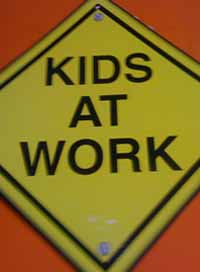School Daze
I wrestle with the guilt. The shame that we have put our children in such a traditional school, one with the classrooms arranged in rows, facing forward, one in which they are expected to consume and memorize the expertise imparted by an authority in the front of the room, a school with teachers who never coordinate their lesson plans or homework assignments, instructing the students without (or with very little) cross-collaboration with the other teachers. A school which measures success on having the right answers rather than the right questions. A school which is old-fashioned.
I feel guilty, especially considering my profession – purveyor of creative thinking, problem solving and innovation – that I’ve settled for less than the kind of  education I know would be far more useful and inspiring for my children.
education I know would be far more useful and inspiring for my children.
The French school is not a bad education. A good portion of the students at the lycée are from local Catalan families who’ve chosen it because of its fine reputation. It provides a rigorous education that prepares children well…for an earlier decade. It’s not – nor was the school they attended in Paris – the kind of school in which I would have expected to have enrolled my children. But we have not managed to find – have I looked hard enough? – a school that fulfills that progressive expectation. When we have found an institution that comes close, it is not close enough to our budget, or close enough to avoid an hour-long commute, each way, every day.
Homeschooling? I’m not that kind of mom. I need a break from them during the day and I need to throw myself into my work. Is that selfish? Or just honest?
“But they’ve lived in different cultures.” This is the protest I hear from my friends when I express out loud my disquiet. “And they already speak four languages.”
Yes, I know we’ve given them a wider horizon. I know they see the world differently living abroad and traveling the way we do. I know that learning languages is probably an advantage, it helps you understand not only the words, but the people and culture that speak with those words. This, I think, Google Translate will never achieve.
I watch them memorize facts and prepare for tests, not for life. They tick off boxes to get their homework assignments done rather than delving into projects and gobbling up the subject. Maybe that’s a tall order, that it wouldn’t feel like work, that they would relish school. Is it so far fetched? What if school was fun? What if they worked on projects in a way that explained the world to them, that taught them things they cared about? What if school seemed more relevant to their lives now? What if school engaged the students to be more creative, rather than killing their creativity?
~ ~ ~
Each September there’s a school meeting at which the teachers and administration are collected to address the assembled parents about the year ahead. I’m inevitably disappointed after this meeting, to the degree that I wonder why I even attend. I long for a visionary administrator – this is an oxymoron, I suppose, except I know it is possible – who will launch into an inspiring presentation about the education they hope to provide the  students. I want teachers who will get up and talk about helping students learn to love to learn, to help them think and ask and be curious. Instead, meetings at the French school begin with, and rather abruptly, the rules and regulations. What time classes start. The signatures necessary for students to leave the campus. The punishment for being late. The punishment system in general. The rules about carrying backpacks and doing homework. I leave shaking my head: What am I doing, with my kids in this kind of school?
students. I want teachers who will get up and talk about helping students learn to love to learn, to help them think and ask and be curious. Instead, meetings at the French school begin with, and rather abruptly, the rules and regulations. What time classes start. The signatures necessary for students to leave the campus. The punishment for being late. The punishment system in general. The rules about carrying backpacks and doing homework. I leave shaking my head: What am I doing, with my kids in this kind of school?
Just a few weeks ago the school sponsored a meeting for teachers and parents during which we were assigned 5-minute slots – yes, five minutes – back-to-back with each teacher. This is barely enough time to explain what’s happening, let alone to dialogue about any issues. The parents dash from classroom to classroom to keep on time, only to find themselves waiting in line because a teacher took too long with somebody else, looking bewildered and muttering to ourselves is this really the way to get meaningful parent-teacher interaction?
I made the mistake of asking, gently, one of Buddy-roo‘s teachers if there was any way she might consider adding other forms of instruction to address different learning styles of her students. The handout she’d distributed for the myth of Isis and Osiris was rather dry, not to mention that it was unintelligible because it was a photocopy of a photocopy. When I was helping Buddy-roo study for the test, it was clear she didn’t understand the story, let alone why it matters. So I gave her an assignment: go to YouTube and find five videos about Isis and Osiris and watch them. Buddy-roo transformed after watching the videos, and she could retell the story and even draw some conclusions about why it was an important myth.
Ludique? Nous n’avons pas le temps!” She explained they didn’t have the time to be playful. Her excuse: there’s a big test three years from now. They have to prepare for it, seriously.
Seriously? We can’t make learning even a tiny bit fun, or at least interesting?For a test that’s years from now?
I knew better than to press further. It was already a risk to even suggest something like this. But I couldn’t help myself, I had to see how she’d respond. On the way home I worried if she might punish Buddy-roo because of her meddling mother. I should know better than to taunt a schoolmarm. Or should I know better than to put my kids into such an old-fashioned, rigid system?

~ ~ ~
Last week I attended a TEDx conference here in Barcelona, one dedicated to the topic of education. A roster of fascinating speakers paraded on stage, each one with an uplifting story: a cross-disciplinary teaching team, project-based learning, an entrepreneurial education program, or a futuristic view of how to teach our children well, for the coming century, not the last. It was all terribly inspiring, and yet I finished the daylong conference feeling even more discouraged. The evidence is there that there are better ways to teach our children, using multi-disciplinary curriculum, team teaching and technology. I know it’s happening in forward thinking school systems, in other places in the world. But the inertia in the system we have chosen is bigger than us. Or I don’t have the stamina to take it on.
As parents, De-facto and I can shore things up around the edges. We invent games for doing homework, we use Post-it notes to help them think about what to cover in their school presentations, we try to help them cultivate their imagination at home, we drag them to creativity conferences and camps. But I know it’s not reinforced at school, at least not consistently. There are some bright spots: Short-pants does have an imaginative English teacher who uses inventive methods in her class, and both the girls rave about their maths teachers. And yes, they’re learning lots of languages. But are they learning what to do with those languages?
I know it’s not easy being a teacher. I don’t think I could do it, spending the entire day with large throngs of pre-adolescents. I know they’re underpaid, even at private and semi-private schools like the Lycée Francais. I know they’re saddled with huge classes, and unruly, overly-entitled students. I know the system they’re working in is focused on testing rather than understanding. But I wonder, do they feel guilty, too? These teachers must read what I’m reading, see what I seeing on-line about schools and the future – it has to be part of the zeitgeist of the world of education. Do they feel as powerless as I do?
I’m trying to do more for the girls. Teaching them to code, rejecting the archaic gender bias and reminding them they are good at math and science, encouraging their passions, nourishing their creativity. But then every morning I send them out the door to go to a school that I’m not convinced can give them the education to prepare for jobs that don’t exist yet, to enter a world that will be very different than the one I encountered after school, to solve possibly insurmountable problems that we’ve hoisted upon their generation. And what do I do? I wave goodbye and close the door, taking in the quiet that descends after their departure. I wrap my hands around a fresh cup of coffee, set my gaze toward my computer to plot my day, attacking my own list of things to do and learn, scrambling to keep up with my own life, let alone to envision what needs to be done for them to create theirs.
the quiet that descends after their departure. I wrap my hands around a fresh cup of coffee, set my gaze toward my computer to plot my day, attacking my own list of things to do and learn, scrambling to keep up with my own life, let alone to envision what needs to be done for them to create theirs.
That’s the problem, isn’t it? Burrowed in to our day-to-day, it’s hard to lift our heads and look at the horizon and think strategically about our lives, our work, our kids and their schooling. Until I carve out the time for that, I’m left with the guilt. Until, I guess, it gets so bad that I do something, which might be simply to decide to stop feeling guilty. They are still bright eyed, curious, open-hearted girls, and they’ll do just fine. But I keep wondering, could we do better?
(Photo credit: “You are the Bows” is artwork by Dan Walker.)


January 27th, 2015 at 6:31 pm
Yeah. In a progressive city within a progressive country, Canada, we found ourselves asking the same questions, although things were better than you describe. The basic problem of teaching-to-test is endemic in North America as well.
We opted for alternative (often private) schools where we could, but similar issues, as well as dissimilar but equally problematic ones, arose.
In the end, our guys got a great education in how NOT to educate 🙂 but they survived, with nimble and creative minds, nonetheless.
January 27th, 2015 at 6:42 pm
You’re teaching your kids to code? To reject gender bias? You encourage their creativity? Their passion? Homework games? They’ve learned four languages? Four? Encountered how many cultures, and different kind of people? Participated in CREA, mindcamp, and explored the Arts? You find ways to help them think about the work they’re doing with post-it notes, youtube quests, and more?
Is that all?
Of course not. The two of you have shown them what it means to love, and be committed to one another. The importance of spouses supporting each others careers. Sometimes you work together, too, right? You’ve also shown them the importance of letting each other “walk, just walk” and remember that even solitude benefits when it’s interrupted for the right celebration.
I’d be remiss if I didn’t mention the obvious. All of the above, is you and De-facto thinking “strategically about their lives, and schooling.” Two parents burrowed in their lives, not buried by them. Two parents of “bright eyed, curious, open-hearted girls” asking the question good parents ask: Will this be enough?
January 27th, 2015 at 7:33 pm
Here is a sample of my day: Get to school at 7:45 – chug coffee, arrange desk.
8 am – tutor ESL kid who is failing all her classes.
9 am – 5th Grade English – 45 minutes drag them through two pages of dense Jack London they barely understand.
15 minute break to refill coffee and answer maybe one or two of 10 parent emails, usually demanding things from me (can you email the missed assignment? why yes, I would love to spend 10 minutes scanning the thing I already sent out, again, and re-mailing it to you. Let me just run down three flights of stairs to the scanner…)
10:10- 4th grade Humanities, a cross-disciplinary class of history, geography and English all in one – planning for this class requires me to write all my own material since the topics we cover are not in any books for their level. – 2 hours teaching.
Lunch time! 20 minutes to shovel food in my mouth while answering emails, and running photocopies. Kids trail in and out asking for things, or just wanting to tell me a story. I always put down my work, make eye contact and listen to them.
12:30 to 1:30 – 5th grade English again! This time I teach them what a verb is, because no one has ever done so before.
1:30 to 3:00 – Third grade humanities! By this time I have been wrangling children all day and the 8 year olds in front of me are very tired. No one in the room wants to be there. But by god, I will teach them something! Maybe.
3:15 to 3:45 – school bus loading time – dealing with kids who lost stuff, who don’t know where they are going, who missed their bus, who need help.
3:45 to 4:30 – Student hours, where I tutor all the struggling kids, at the end of the day when my patience is about zero, is when I help kids who need the help most.
4:30 – parent meeting! “Why haven’t you made my boy love reading yet?” she demands. “What specific ways are you working to ensure he, in particular, learns to love reading?” My inner voice says, why didn’t YOU teach your apathetic and spoiled son to love reading? I have 160 kids. You have two. You do it. My outer voice says, “I will try harder.”
5:00 pm! Now I finally have time to plan my lessons. I have to plan for six teaching hours a day, every day. This takes an hour if I do a terrible job, and up to 4 hours to plan for a set of lessons which foster creativity, different learning styles, and that don’t involve shitty photocopies of worksheets. Then, I can write any tests I need to, and THEN I can start the grading. At report card time, I usually work from 8 am until midnight all week, five times a year. Some of my co-workers work this much all the time.
I am not exaggerating. My salary comes out to minimum wage at times. And I work for a progressive, fancy, private school in Brooklyn.
Do I care? Of course I do! As every teacher, everywhere has said, we sure as hell don’t do this for the money. The problem with education IS NEVER THE TEACHER’S FAULT. Teacher blaming is the new thing. I nearly had a meltdown before Christmas break, and then on the day of break, the parents gave me a surprise bottle of good champagne, a card extolling my virtues and their gratitude, plus a hefty, hefty check. Amazingly, all my stress dissipated. I felt appreciated. It renewed my vigor and made me remember I have these people’s kids in my hands and they need me to do a good job and they APPRECIATE it. I’m serious. Parents and good teaching practice demand that we use positive reinforcement on their kids, so use it on teachers too! It really works!
I would advise that one never suggest to a teacher how to he/she could possibly do a better job because yes, they will hate it. And yes, we take annoying parents out on their kids. We are only human. When we perceive that we are doing the best we can, above and beyond our pay grade, and we wake up at 4 am wondering why that kid just won’t get that concept, or why that parent won’t get behind their kid’s education and help them with their homework, and then after a long day doing all that stuff I just mentioned, a parent asks us, we aren’t you doing it this better way? It makes us go home and cry. It really does.
To be truly effective, teachers should teach a maximum of three to four classroom hours a day, and get paid more. Paying teachers more will also attract better educated people, and will provide more incentive to work those 16 hour days. Or, pumping money into the education system will allow to hire more teachers, so we can do less work.We know the theories about differentiated learning, and project based learning and providing fun exploratory lessons. We don’t have the time or energy though. I can’t even imagine working in a public school in NYC. It sounds horrific.
The overhaul of the whole education system needs to happen at the roots of society as a whole. What does the whole society value? Until that changes, the education system has very little chance of changing on a large scale. Your girls are lucky they have you as parents.
January 28th, 2015 at 1:53 am
First of all I second everything Andy wrote – he is absolutely right – you and Defacto are doing all the right things and in all the right ways. So what’s broken in the system and what needs fixing – are two completely different questions with surprisingly different answers. What’s broken in the system is the crazy pressure on the students and the teachers to meet standards. Standards of performance which are increasingly redundant as the world around us is moving relentlessly forward and our education fails to keep pace. A lot more can be said about this – however while we can think of a dozen or more ways to fix the broken system – there is something else that desperately needs fixing – and that is the parents’ role. Our definition of education seems to be limited to what happens within the four walls of a classroom. However “education” is so much more…it is the development of skills through instruction and experience. This “education” can and should be provided by parents, mentors, peers, and community. When we leave the entire responsibility on the shoulders of the over stretched teachers – we are short changing our children. Parents like yourself sense this responsibility and play your part as best as you can within the context. However there are sadly so many parents who are not even considering these issues and if they are they do not see that they have a part to play in solving or alleviating the problem.
January 28th, 2015 at 10:51 pm
M, you are INCREDIBLE parents. ABSOLUTELY STELLAR PARENTS. As a teacher, I so appreciate when I come across parents like you two who genuinely invest yourselves in challenging your girls to grow and imagine and think and inquire continuously. The questions you are asking about the education system at Lycée Francais are totally valid. I do agree that this is an antiquated system. While I can somewhat relate to Deirdre’s experience, as a teacher in a school with an entirely inquiry-based, teacher-generated curriculum, I feel simultaneously, challenged, exhausted, and inspired all the time. I think perhaps this is what is lacking at the core of these old-school systems. When teachers are inspired and challenged, however exhaustive the work may be, I think it raises the level of inspiration and creativity they impart on their students.
This said, your girls are independent, thoughtful, self-motivated, creative, and imaginative by nature and by nurture and I would venture to guess that this rigid system will simply expose them to something they wouldn’t otherwise experience in their richly stimulating young lives.
Keep teaching them, keep sharing and questioning, keep exposing them and encouraging them to inquire. And then talk to them about their thoughts and observations and conclusions about this school system compared with their Paris experience. How would they design a school? a learning day?
And RELISH that independent time in your daily routine. You deserve it. I don’t think it’s a bit selfish. It’s healthy. Balance. Home-schooling is rarely the answer. Those girls are getting LIFE experience. And it’s because you two are such great parents that you don’t just let them experience it, you engage them in it. And you are always involved and asking questions about it.
Carry on with your BAD SELF, MAMA!
LOVE AND MISS. I’d love to get down to Barcelona for a visit…
January 30th, 2015 at 3:25 am
Huzzah to all the comments! Yes, your girls have survived the efforts to suppress them in education because of the lives they lead beyond the school with you. Creative minds all have a lot to say about enduring and moving beyond the classrooms of their childhoods, and about the occasional teacher who set them free and soaring. Short pants & Buddy Roo already have the power to recognize and break through. And you have taught them the persistence to get through the maze and dance down the path.
February 1st, 2015 at 3:27 am
We can always do better, but I don’t know that the better that we could do is realistic. I don’t mean that in a lazy way, I mean it in that we keep moving the goddamn carrot. Sorry.
This made me cry. Parenting makes me cry. Living makes me cry. So I whack the dial off the gauge and turn away from the dash sometimes. I express that some of the teachers are not in the game, but that they are the ones in charge for now. We learn about moving through the lackluster, but not allowing it to stunt our growth. Would a fantastic, progressive teacher be better? You bet, but I cannot get there.
You are doing great, because I have to believe that even when we falter, we’re teaching them something, and they us. <—likely messed up grammar, but I am still communicating.
Bad night. Great post. Missing you.